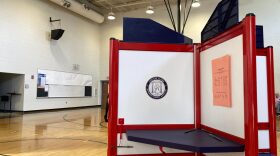-
Noncitizens can't vote in any local or state elections in Kentucky. An amendment passed the Senate Monday that would further codify the ban into the Kentucky Constitution.
-
While every GOP member of the committee voted for Senate Bill 80, Republican Secretary of State Michael Adams warned the bill could risk Kentucky’s voter ID law being struck down in court, while alienating younger voters.
-
In comments to a Kentucky House panel, Secretary of State Michael Adams bluntly urged lawmakers to “not go backwards” as he defended the law allowing three days of no-excuse, in-person early voting. It allows Kentuckians to go to the polls on the Thursday, Friday and Saturday before an election.
-
Turnout at elections without national names on the ballot has historically been low in Kentucky. With a tight gubernatorial election, which candidate can drive more voters to the polls could make the difference.
-
The percentage of Kentucky's registered voters who aren't affiliated with the Republican or Democratic parties reached a new high at the end of 2022, Secretary of State Michael Adams said.
-
Kentucky’s official voter turnout report isn't yet available. But Secretary of State Michael Adams says the Commonwealth is on track to hit or surpass a 50% turnout.
-
Election Day: Voters decide local races, constitutional amendments, control of U.S. House and SenateVoters in Kentucky, Indiana, Tennessee, are among those casting ballots Tuesday on Election Day. More than 253,000 Kentuckians took advantage of the state's early in-person voting period last week and have already had their say.
-
According to Republican Secretary of State Michael Adams, 253,018 Kentuckians voted during the three-day window for no-excuse in-person voting. The total includes 121,280 Republicans, 117,576 Democrats, and 14,162 Independents.
-
The wave of misinformation has taken a toll on county clerks. According to Republican Secretary of State Michael Adams, nine county clerks retired before the end of their terms this year and 13 didn’t seek reelection.
-
The president has been under increasing pressure to more aggressively combat threats to voting rights. And advocates say speeches are not a substitute for legislative action.
Play Live Radio
Next Up:
0:00
0:00
Available On Air Stations









